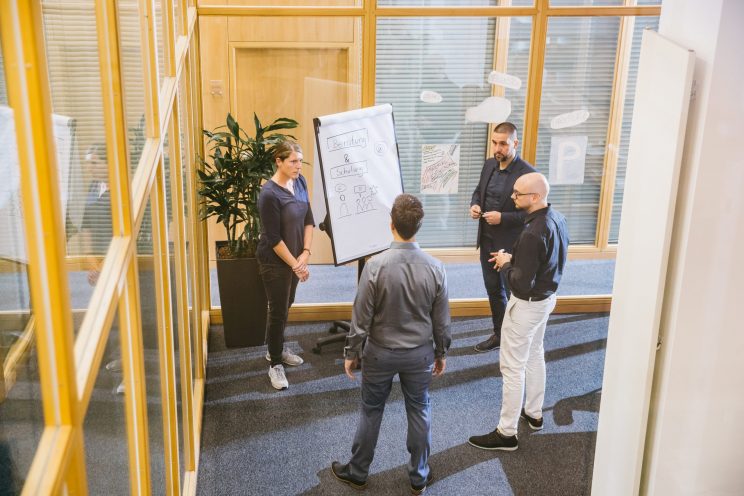The programmes Griffbereit and Rucksack KiTa are successful models from North Rhine-Westphalia that are in demand throughout Germany and Europe. In view of the challenges of the last few years, such as refugees and new immigration, and the steadily increasing demand and the dissemination of the programmes that has already taken place, a nationwide transfer of the programmes is necessary. Griffbereit and Rucksack KiTa A federal transfer team - based at the Centre for Turkish Studies and Integration Research (ZfTI) - was established in 2017. Funding is provided by the Auridis Foundation.
28 June 2022
ZfTI - Foundation Centre for Turkish Studies and Integration ResearchJRF-intern
JRF Interview: Griffbereit & Rucksack KiTa - Hand in Hand for Children with a Refugee and Migrant Background
Around one in four people in Germany has a migration background. The importance of integrating refugee families with children in particular is also evident against the current backdrop of war. At JRF Institute NDT - Centre for Turkish Studies and Integration Research is used in the projects Griffbereit & Rucksack KiTa Language education is made possible and lived. Marc Christian Neumann, Coordinator for Federal Transfer at the ZfTI, shows the relevance of multilingualism and explains how the programmes are being promoted nationwide, starting from NRW.

The federal transfer team of the ZfTI in close exchange for the nationwide establishment of the programmes Griffbereit & Rucksack KiTa.
What are "Griffbereit & Rucksack KiTa" exactly?
NeumannThe programmes Griffbereit & Rucksack KiTa stimulate parent-child interaction to strengthen multilingual development and education. Concepts of diversity-conscious cooperation strengthen the educational partnership between families and educational institutions. This also requires the support of families by trained parent guides. These are programmes for families of all languages. Griffbereit is designed for families with and without international family history aged 1-3 years. Rucksack KiTa is suitable for families with an international family history aged 4-6 years. If parents speak to their children both in the family language and in the national language that is new to them, language acquisition is promoted through socioemotional development. Multilingualism enables lived diversity and promotes social cohesion and is thus a component of a diverse, tolerant and open society.
The Ministry for Children, Youth, Family, Equality, Refugees and Integration of the State of North Rhine-Westphalia (MKJFGFI) finances the programmes and accompanies them in terms of content and expertise. Local coordination is carried out in cooperation with the municipal integration centres. Since 2021, the ZfTI has taken over the transfer for the systematic dissemination of the programmes at federal level with funding from the Auridis Foundation. One of the main reasons for locating the federal transfer team at the ZfTI is our specialisation in science and practice transfer to promote the further development of the immigration society.
In relation to the concrete situation: Let's assume a refugee family, for example from Ukraine, arrives in Düsseldorf - how do they find these services and what role does the Federal Transfer Team at the ZfTI play in this?
NeumannIn NRW there are in particular the KIs, the Municipal Integration Centres. There, networks with the parent guides actively initiate programmes that deal with the current war situation very well. There are groups that are also specifically aimed at families with Ukrainian as their family language. Our Homepage of Griffbereit & Rucksack KiTa also serves as an interface and exchange medium.
We as the federal transfer team at the ZfTI are there to establish the programmes nationwide from NRW and to accompany already existing state coordinations. Always with the aim of creating new state coordination offices. We facilitate the coordination and support the respective colleagues nationwide. In other words, we organise Scientific and practical specialist events very concretely on the topic of flight. Among other things, in cooperation with the MKJFGFI, we have given the lecture "They are just children..." - Opportunities and challenges of integrating children and families with refugee experience can realise. Basically, we discuss the conception of events based on the needs identified in team meetings. What is the theoretical background, where can we start? Always with the overriding goal: to create a nationwide, sustainable transfer of know-how.
To ensure that the families receive the best possible support at the end, you work closely together in a team of six. Into which areas of responsibility do you divide yourselves?
NeumannMy colleague Gökhan Kabaca is responsible for counselling and training. He finds new cooperation partners, advises interested institutions and trains the respective coordinators nationwide, who pass on their knowledge to the parent guides. In addition, my colleague Safa Mazi responsible for data and quality assurance, i.e. he conducts the qualitative and quantitative evaluation. In addition, in the area of coordination he represents Pinelopi Kouloukourgiotouwho is currently on parental leave. My colleague Ellen Brings has the hat on for material developments. She revises older materials and brings them up to the latest pedagogical standards. She also develops new learning and play materials and always keeps an eye on which translations need to be done. Currently, there is a great need for Ukrainian materials. I myself am responsible for the overall coordination, but also for communication and public relations within the programmes.
Furthermore, I would like to Miriam Weilbrenner She represents the technical supervision of the programmes in the MKJFGFI. We work closely with her and make joint decisions, for example within political-strategic and scientific communication.
The programmes are a living transfer of migration and integration research into everyday life and thus represent the self-image of the JRF. What does the scientific monitoring and evaluation of the project look like?
NeumannWe develop feedback options tailored to the two programmes to evaluate the organisational implementation as well as the survey of learning progress through the learning materials provided and joint exercises. Here, our homepage in the protected login area forms an important interface. Our goal is to expand this to such an extent that the evaluation can take place completely via this. There is a lot of work to be done here, because there are about 80 participating institutions in Duisburg alone. It is very time-consuming for the coordinators to manually record the feedback from the participating families and facilities nationwide. Therefore, the goal is to bundle the feedback in such a way that only the verification by the coordination office is needed.
Is there anything else you would like to say at this point?
NeumannIn our experience, the earlier families with a migration background are reached, the greater the impact on the children's successful educational biography. That is why we value all family languages. Currently, the learning materials are available in 30 languages and the number is constantly increasing. We conduct regular needs assessments to find out which languages are still missing in order to successively expand the materials for families and parent guides. Based on this, there is a curriculum that was published last year. We are constantly developing new methodologies in order to live diversity and keep up with the times. We want to keep improving and expanding our language offer and our programme materials.
The interview was conducted by Wiebke Schuppe (JRF).


